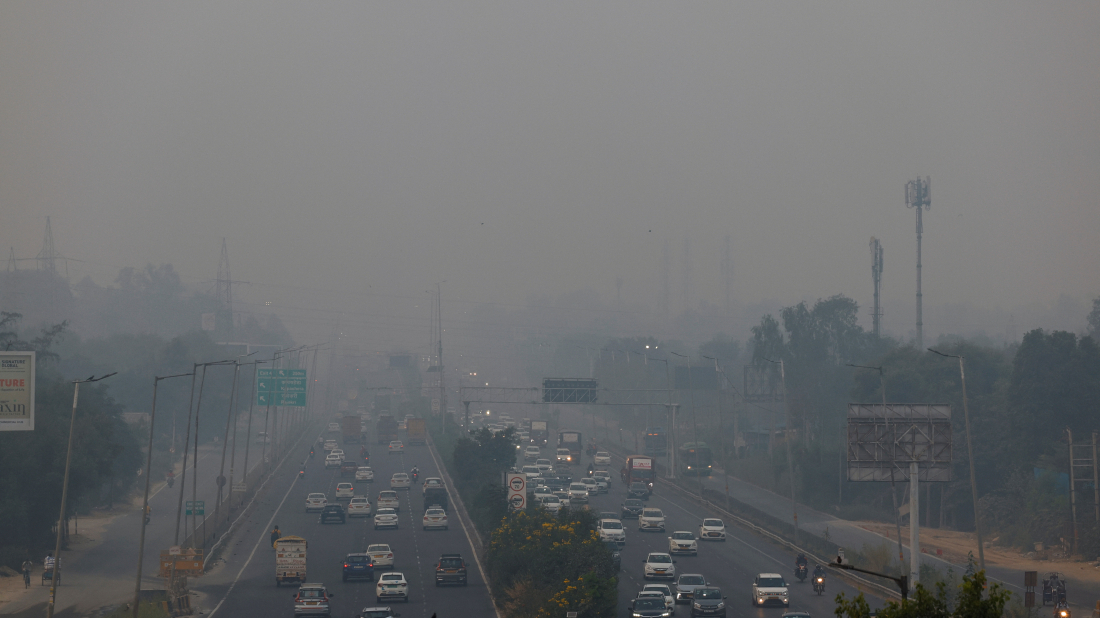Ukraine imposes new sanctions targeting Russian maritime and defence supply chains
Ukraine’s President Volodymyr Zelenskyy has approved new sanctions targeting Russian maritime operators, defence-linked companies and individuals co...

To combat the decline in air quality during the past three weeks, authorities in the capital and surrounding cities of India fined thousands of car owners and construction sites for violating pollution regulations.
As the city struggles with a sharp drop in air quality over the last three weeks, authorities in New Delhi and the neighbouring districts have fined thousands of car owners and construction sites for breaking pollution laws. The Swiss group IQAir claims that New Delhi is currently the most polluted major metropolis in the world.
Nearly 60,000 cars and more than 7,500 construction sites have been fined, according to officials. The Central Pollution Control Board (CPCB) declared the air quality to be "very poor," with an index score of 373. Unhealthy circumstances are indicated by scores greater than 300. Nearly 3,900 older vehicles were seized, and another 54,000 vehicles were discovered to be missing their pollution under control (PUC) certificates.
Environmental compensation has been mandated for 597 construction sites, with 56 sites ordered to cease operations. New Delhi faces significant pollution challenges every winter, as cold air traps emissions and smoke from agricultural burning in neighbouring states like Punjab and Haryana. Due to this persistent problem, construction operations have been restricted and schools have been closed.
Forecasts indicate that the region's air quality will continue to range from "very poor" to "severe" for the next six days, with the status remaining "very poor". There are major health hazards associated with a "severe" rating, which the CPCB defines as a score between 401 and 500, especially for people who already have health issues.
For four years running, IQAir has ranked New Delhi as the most polluted capital in the world; air quality problems are also common throughout South Asia. Rising pollution levels can shorten life expectancy in the area by more than five years, according to research from the University of Chicago's Energy Policy Institute.
Quentin Griffiths, co-founder of online fashion retailer ASOS, has died in Pattaya, Thailand, after falling from the 17th floor of a condominium on 9 February, Thai police confirmed.
Cubans are increasingly turning to solar power to keep businesses operating and basic household appliances running during prolonged electricity cuts, as fuel shortages make diesel generators and other temporary solutions more difficult and costly to maintain.
Ukraine’s National Paralympic Committee has announced it will boycott the opening ceremony of the Milano Cortina 2026 Paralympics in Verona on 6 March, citing the International Paralympic Committee’s decision to allow some Russian and Belarusian athletes to compete under their national flags.
Eric Dane, the actor best known for his roles in 'Grey’s Anatomy' and 'Euphoria', died on Thursday, at the age of 53 after a battle with amyotrophic lateral sclerosis (ALS). His family confirmed his death after what they described as a “courageous battle” with ALS.
An Austrian climber has been convicted of gross negligent manslaughter after his girlfriend died from hypothermia while climbing Austria’s highest peak, the Grossglockner, in January 2025.
The administration of U.S. President Donald Trump on Thursday (12 February) announced the repeal of a scientific finding that greenhouse gas emissions endanger human health, and eliminated federal tailpipe emissions standards for cars and trucks.
Tropical Cyclone Gezani has killed at least 31 people and left four others missing after tearing through eastern Madagascar, the government said on Wednesday, with the island nation’s second-largest city bearing the brunt of the destruction.
Rivers and reservoirs across Spain and Portugal were on the verge of overflowing on Wednesday as a new weather front pounded the Iberian peninsula, compounding damage from last week's Storm Kristin.
Morocco has evacuated more than 100,000 people from four provinces after heavy rainfall triggered flash floods across several northern regions, the Interior Ministry said on Wednesday.
Greenland registered its warmest January on record, sharpening concerns over how fast-rising Arctic temperatures are reshaping core parts of the island’s economy.
You can download the AnewZ application from Play Store and the App Store.

What is your opinion on this topic?
Leave the first comment